![]()

Muroyama: From economic and energy issues to environmental concerns, the world today faces many problems. In such circumstances, what is the significance of human space exploration? Fifty years has passed since the first human spaceflight. What are the achievements of the last 50 years, and what agenda do we have now? How should human space exploration be carried out? These are the topics we would like to discuss today. Let’s start by talking about the achievements of the past 50 years.
Logsdon: The most memorable event in the half-century history of human space exploration is the 1969 Moon landing. However, this endeavor was merely the first step in bringing human civilization beyond our mother planet, Earth. We cannot be satisfied by this alone.
Inagaki: I too remember the Apollo Moon landing very well. When I watched it, I was very impressed by what humans were capable of, and was filled with hope and confidence. The management system developed to implement such a large-scale project has since become the baseline for industrial applications in space, so I think that Apollo’s contributions to the industrialization of space were significant.
Shiroyama: Japan decided to participate in the International Space Station (ISS) program in the 1980s, and has continued to contribute, by trial and error, ever since. Japan has been involved in this large-scale international project from the beginning, and has learned a lot. The country has also achieved acclaim and earned trust in the international community in its own unique way. I think these facts can be regarded as assets.
Tsukio: Space exploration has brought us many benefits, and in fact the Internet is one of them. The Internet is said to be a technology that was developed as a result of the launch of the Soviet Union’s Sputnik, the world’s first artificial satellite, in 1957. Out of a fear that bombs might be dropped from satellites, the United States wanted to ensure that a communication network would survive in case of emergency, and started the research that eventually lead to the Internet in the 1960s.
Neal: I called my family in the U.S. using my mobile phone just a while ago. It means that I talked with my family via satellite. Such a satellite-based mobile phone is a concrete outcome of space exploration. The technology to miniaturize mobile phones and the dramatic advancements in computers are also a result of space exploration, and have had a great impact on people’s lives.
Dupas: The photos taken by the Apollo astronauts showed the Earth as a small, blue planet, and inspired many people. Considering the fact that the advancement of space technology also plays an important role in society, it is important for the younger generation to be inspired by space, and to become interested in science and technology. I think that this has also been an achievement of human space exploration.
Contant: The human Moon landing stands out in my memory, too. I think that this is the greatest single accomplishment to expand the possibility of space exploration.
Muroyama: Ms. Sasaki, among the panelists today, I think that your point of view is probably closest to the public’s. Why do you think that humans should go to space?
Sasaki: Humanity’s landing on the Moon had a big impact on me, too. I felt a great change – mysterious, unknown outer space became more approachable. Since someone had really gone to the Moon, I thought that I might have a chance to go to space someday, too. I feel that the question of why humans go to space has to do with the profound question of why we are alive. What are the emotions that human beings feel when they go to space? There is a greater meaning to the experience. If it is only about collecting data, I don’t think that it has to be human beings going there.
Muroyama: The operation of the ISS is scheduled to continue until at least 2020, but its cost-effectiveness is in question. Let’s hear your opinions, including your evaluation of the ISS.
Logsdon: The ISS was just completed in July 2011, and only a year and half has passed since then. So I think it is too early to judge its scientific and economic merits based on the initial investment costs. We will finally be able to answer this question with results that will be achieved in the next five years or so. However, the merits won’t necessarily always be visible. Some effects will include things that are impossible to measure on an economic scale, such as the impact on the human mind, so we must look at its value in a broad way.
Neal: I agree. It has been only a year and half since the completion of the ISS, so we still can’t measure its cost-effectiveness. However, a roadmap of the future of the ISS has to be made among the international partners. From international perspectives, it is important to look at what is working and what is not working, and what are the things that are only possible to achieve with human involvement. I think that great international cooperation and collaboration has been established thanks to the ISS program. This is one of the accomplishments of the ISS.
Inagaki: In Japan, the benefits of the ISS will be evaluated based on the results of experiments conducted in the Japanese Experiment Module Kibo, and these will take a little longer to come out. However, in the process of building Kibo, Japan’s space industry has learned human space technology, and the credibility of our technology has been further increased as the international team has carried out the project. The value of this achievement is difficult to calculate, but I think it has helped advance Japan’s technology.
Muroyama: Many negative opinions are heard about the current cost-effectiveness of the ISS, but our conclusion is that it is too early to assess the space station’s accomplishments. So we are looking forward to future outcomes. Now, how do you think the ISS should be operated going forward?
Logsdon: Taking into account the current U.S. economic situation, I don’t see that there will be a great increase in the space budget. So the U.S. will continue to conduct human space exploration at a similar level to current programs. As far as the ISS is concerned, its value will be assessed not only in scientific and economic terms, but also from the perspective of commercial applications. Depending on the conclusion, the ISS may be operated under private initiatives in the future. Technologically, the operation of the ISS can continue after 2020, but only if it can generate results that justify an operating cost of $2-3 billion a year.
Dupas: We can’t expect an increase in the space budget in Europe either, but it will not decrease either. Even with a flat budget though, as long as we can advance technology and choose the right missions, I think it will be possible to move human space exploration forward. As for the ISS as a space laboratory, can it generate a payback to meet the investment? We can’t reach that conclusion right away, but the point where we have to make a decision will come for sure. Besides its use as a laboratory, the ISS could also function as a relay point for going to the Moon or to Mars. I hope there will be comprehensive discussions among the international partners that will take these points into account.
Inagaki: There is no way we can abandon the ISS after spending such a long time building it. For example, it could act as a base for the removal of space debris, which has become a problem. If we want to use if efficiently, I think the ISS will need some renovation, but again, cost will become an issue. Regarding the future operation of the ISS, it will be good to hear many different ideas about how it can be done cost-effectively.
Muroyama: China is saying that it will build a space station by itself. How do you see the future relationship with China?
Contant: Our International Academy of Astronautics has an office in China to build a relationship with the country. At the moment, the political environment is not so favorable, but the space community there is positive about collaborating with us. China would like to develop its own space station, but I think that there are similarities and complementary features with the ISS, so we may be able to talk and share our experiences with each other.
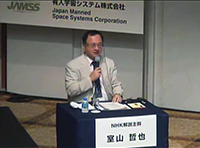
Tetsuya Muroyama (Senior Commentator, NHK)
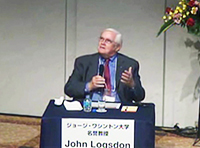
John Logsdon (Professor Emeritus, George Washington University, United States)
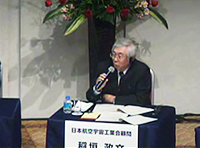
Masafumi Inagaki (Adviser, Society of Japanese Aerospace Companies)
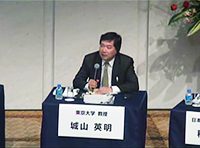
Hideaki Shiroyama (Professor, University of Tokyo)
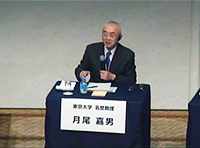
Yoshio Tsukio (Professor Emeritus, University of Tokyo)
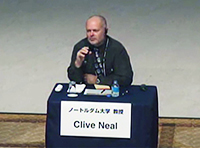
Clive Neal (Professor, University of Notre Dame, United States)
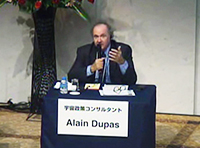
Alain Dupas (International Consultant)
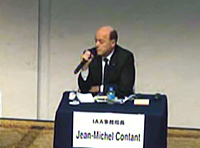
Jean-Michel Contant (Secretary General, International Academy of Astronautics)
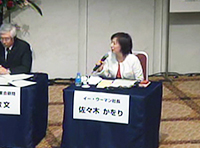
Kaori Sasaki (CEO, ewoman, Inc.)
